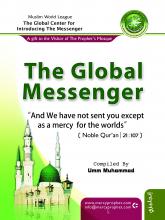The Prophet of Mercy Website
Muslim World League - Global Commission for Introducing the Messenger
According to the Qur’an, war represents an “unwanted obligation” which has to be absolutely carried out with strict observance of particular humane and moral values and resorted to only when it is inevitable.
In a verse, it is explained that those who start wars are the disbelievers and that God does not approve wars:
[…Each time they kindle the fire of war, Allah extinguishes it. They rush about the earth corrupting it. Allah does not love corrupters.] (Surat Al-Ma’idah 5:64)
A closer examination of Prophet Muhammad’s life reveals that war is a method resorted to for defensive purposes only in unavoidable situations.
The revelation of the Qur’an to Prophet Muhammad lasted for 23 years. During the first 13 years of this period, Muslims lived as a minority under a pagan rule in Makkah and faced much oppression. Many Muslims were harassed, abused, tortured, and even murdered, their houses and possessions were plundered. Despite this, Muslims led their lives without resorting to any violence and always called pagans to peace.
When the oppression of pagans escalated unbearably, Muslims emigrated to the town of Yathrib, which was later to be renamed Madinah, where they could establish their own order in a more friendly and free environment. Even establishing their own political system did not prompt them to take up weapons against aggressive pagans of Makkah. Only after the following revelation, the Prophet commanded his people to get prepared for war:
[Permission to fight is given to those who are fought against because they have been wronged - truly God has the power to come to their support - those who were expelled from their homes without any right, merely for saying, ‘Our Lord is God’…] (Surat Al-Hajj 22:39-40)
In brief, Muslims were allowed to wage war only because they were oppressed and subjected to violence. To put it in another way, God granted permission for war only for defensive purposes. In other verses, Muslims are warned against use of unnecessary provocation or unnecessary violence:
[Fight in the Way of God against those who fight you, but do not go beyond the limits. God does not love those who go beyond the limits.] (Surat Al-Baqarah 2:190
After the revelations of these verses, wars occurred between Muslims and pagan Arabs. In none of these wars, however, were the Muslims the inciting party.
Furthermore, Prophet Muhammad established a secure and peaceful social environment for Muslims and pagans alike by signing a peace agreement (Hudaybiya) which conceded to the pagans most of their requests. The party who violated the terms of the agreement and started a new war was again the pagans.
However, with rapid conversions into Islam, the Islamic armies attained great power against the pagan Arabs and Prophet Muhammad conquered Makkah without bloodshed and in a spirit of tolerance. If he willed, he could have taken revenge on pagan leaders in the city. Yet, he did not do harm to any one of them, forgave them and treated them with the utmost tolerance. Pagans, who would later convert to Islam by their own will, could not help admiring such noble character of the Prophet.
The Islamic principles God proclaims in the Qur’an account for this peaceful and temperate policy of Prophet Muhammad. In the Qur’an, God commands believers to treat even the non-Muslims kindly and justly:
[...God does not forbid you from being good to those who have not fought you over religion or driven you from your homes, or from being just towards them. God loves those who are just. God merely forbids you from taking as friends those who have fought you over religion and driven you from your homes and who supported your expulsion...] (Surat Al-Mumtahanah 60:8-9)
The verses above specify the outlook of a Muslim on non-Muslims: A Muslim should treat all non-Muslims kindly and avoid making friends only with those who show enmity to Islam. In case this enmity causes violent attacks against the existence of Muslims, that is, in case they wage a war against them, then Muslims should respond them justly by considering the humane dimensions of the situation. All forms of barbarism, unnecessary acts of violence and unjust aggression are forbidden by Islam.
In another verse, God warns Muslims against this and explains that rage felt for enemies should not cause them to drift them into injustice:
[You who believe! Show integrity for the sake of God, bearing witness with justice. Do not let hatred for a people incite you into not being just. Be just. That is closer to heedfulness. Heed God (alone). God is aware of what you do.] (Surat Al-Ma’idah 5:8)
http://www.imanway.com/site/en
******






